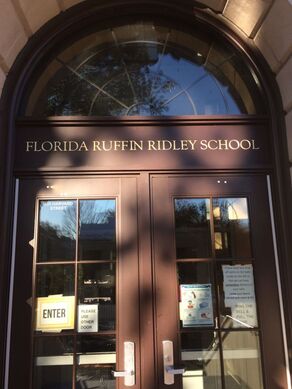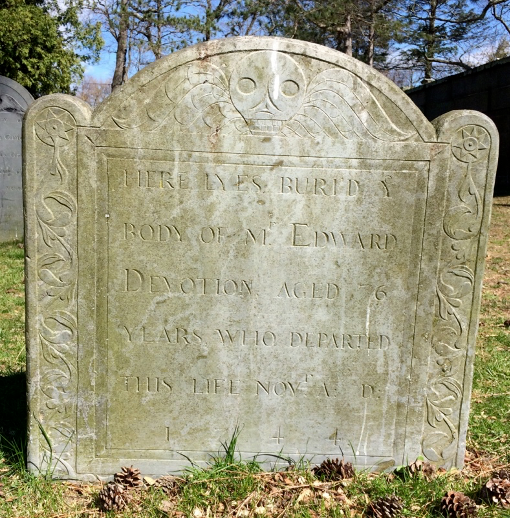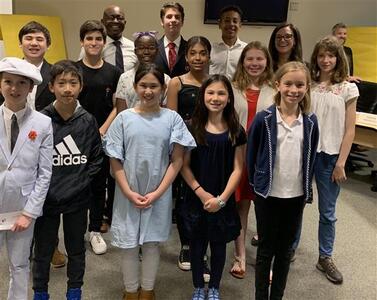Edward Devotion and slavery
Edward Devotion (1688-1744) was an enslaver who had a school named for him from 1892 to 2018. In 2018, Town Meeting voted overwhelmingly to remove his name from the school. At the end of a year-long selection process, Town Meeting voted to rename the school after Florida Ruffin Ridley, an African American civil rights leader who had lived in Brookline with her family.
Edward Devotion had owned four properties, including a slave and three pieces of land, the largest of which was in what was later known as Coolidge Corner. His home still remains on this property.
In his will, Devotion left a few bequests, requested that any debts be paid, and directed that the rest of his estate be given to the town, to be used if possible for a school “near the center of town”. At the time of his death, the town’s center was near Walnut St, over a mile from Devotion’s home.
Edward Devotion had owned four properties, including a slave and three pieces of land, the largest of which was in what was later known as Coolidge Corner. His home still remains on this property.
In his will, Devotion left a few bequests, requested that any debts be paid, and directed that the rest of his estate be given to the town, to be used if possible for a school “near the center of town”. At the time of his death, the town’s center was near Walnut St, over a mile from Devotion’s home.
Devotion's Will
In the name of God Amen. I Edward Devotion of Brooklyn . . . do make and ordain this my Last Will . . . Principally & First of all I give & recommend my soul to God . . .
And as for my temporal Goods and Estate I give and bequeath . . . [Here, Devotion lists specific amounts for his wife, four others, plus his church. He had no children.]
In case my estate proves sufficient to pay my just Debts, Funeral Charges and the aforementioned Legacies and there should be any overplus left then my will is and I hereby give the overplus to the Town of Brooklyn toward building or maintaining a school as near the Centre of the said town as shall be agreed upon…”
And as for my temporal Goods and Estate I give and bequeath . . . [Here, Devotion lists specific amounts for his wife, four others, plus his church. He had no children.]
In case my estate proves sufficient to pay my just Debts, Funeral Charges and the aforementioned Legacies and there should be any overplus left then my will is and I hereby give the overplus to the Town of Brooklyn toward building or maintaining a school as near the Centre of the said town as shall be agreed upon…”
His Probated Property
15 acres * |
£310 |
7 acres * |
£105 |
1 Negrow + |
£ 30 |
1 cow |
£14 |
household goods |
£105 |
- In fact Edward Devotion had owned a total of 98 acres, the 22 seen above, plus 76 acres in Coolidge Corner. A few years before he died, he had sold the 76 acres to a friend, Solomon Hill. Some years after Devotion died, Hill became unable to continue paying the mortgage. Town Meeting moved quickly to take ownership of the property, as per Devotion’s will, and sold it on behalf of the Town.
The Controversy
The Campaign to remove Edward Devotion’s name from the school
In 1891, one hundred forty-seven years after Devotion’s death, the town bought Devotion’s house and some of the land he had owned.[1] The following year, the town built a school there, naming it the Edward Devotion School. No records exist to tell what, if anything, people said at that time about Edward Devotion or the choice of the school’s name.
For the following 126 years, until the winter of 2017/18, few people knew and no one paid attention to the fact that Devotion had owned a person. In early 2018 a small group of deeply concerned residents, led by Deborah Brown and Anne Greenwald, made this fact public and demanded that Devotion’s name be removed from the school. The whole town, especially Devotion students and their families, needed to decide how much slavery mattered today.
Those in favor of keeping his name argued that the name was historic. They argued further that “Devotion School” was the name students, parents & alums used to express their connection with the school. Those wanting to keep Devotion’s name also pointed out that he had owned only one slave, which is true if looking at it from Devotion’s viewpoint. Some supporters argued that slavery in the North was not as cruel as Southern slavery. This is a tired myth that is factually incorrect.
Those in favor of removing Devotion’s name argued that no student should be at a school named for an enslaver, a man who had violated one of the most fundamental human rights. Those in favor asked people to look at this enslaved person from his viewpoint and his life; he was alone when he needed comfort or help to assuage any wounds Devotion may have inflicted.
In Brookline and throughout the region, enslavers deliberately bought twice as many men as women, leading to jealousy, anger, and longing for many. Slavery like this was a form of aching loneliness. In Brookline, almost half of the 42 known enslavers were like Devotion, owning “just” one person. The elected Town Meeting has the sole authority to give, remove, or select a school’s name. The proponents of changing the school’s name organized widely, quickly, and effectively. At Town Meeting, Raul Fernandez was among those speaking from the floor:
For the following 126 years, until the winter of 2017/18, few people knew and no one paid attention to the fact that Devotion had owned a person. In early 2018 a small group of deeply concerned residents, led by Deborah Brown and Anne Greenwald, made this fact public and demanded that Devotion’s name be removed from the school. The whole town, especially Devotion students and their families, needed to decide how much slavery mattered today.
Those in favor of keeping his name argued that the name was historic. They argued further that “Devotion School” was the name students, parents & alums used to express their connection with the school. Those wanting to keep Devotion’s name also pointed out that he had owned only one slave, which is true if looking at it from Devotion’s viewpoint. Some supporters argued that slavery in the North was not as cruel as Southern slavery. This is a tired myth that is factually incorrect.
Those in favor of removing Devotion’s name argued that no student should be at a school named for an enslaver, a man who had violated one of the most fundamental human rights. Those in favor asked people to look at this enslaved person from his viewpoint and his life; he was alone when he needed comfort or help to assuage any wounds Devotion may have inflicted.
In Brookline and throughout the region, enslavers deliberately bought twice as many men as women, leading to jealousy, anger, and longing for many. Slavery like this was a form of aching loneliness. In Brookline, almost half of the 42 known enslavers were like Devotion, owning “just” one person. The elected Town Meeting has the sole authority to give, remove, or select a school’s name. The proponents of changing the school’s name organized widely, quickly, and effectively. At Town Meeting, Raul Fernandez was among those speaking from the floor:
It’s important to start with a simple fact: In our society, names matter. They matter to us as individuals…And names matter to us as communities…For us, the naming of public buildings and memorials is an honorific, a kind of monument…
But, we have to recognize that just because a name was etched on a building by those with the privilege and power to do so, that we are not bound to honor it for all eternity. In this nation, long ruled by a white patriarchy, historians have uplifted slaveowners because of their notable contributions while glossing over their dreadful pasts and worse—ignoring the contributions of women, blacks and other marginalized groups…
[This warrant article] will bring us one step closer to justice. It will put an end to the complicity in honoring a man that took ill-gotten gains as a result of the unpaid labor.
Raul Fernandez, Town Meeting
On May 29, 2018, Town Meeting voted overwhelmingly to remove Edward Devotion’s name. Until a new name was chosen, the school would carry a bland interim name, the Coolidge Corner School.
Two Bee-lievers Speak on Their Experience
A New Name

The School Committee created an innovative process for choosing the new name. Over the following year, rich input was solicited from three sets of people: the Bee-lievers committee of Coolidge Corner students; the broader public; the School Committee. At the end, the Town Meeting again would choose the name for the school. The “Bee-lievers” were a committee of Coolidge Corner students, chosen from an inclusive lottery system.
Before Town Meeting met, Ridley supporters crafted a detailed email to all Town Meeting Members on who Ridley was and why she deserved this honor. Many town residents joined in organizing, calling all Town Meeting Members, especially after an unusual parliamentary procedure was announced that could undercut Ridley votes.
Not everyone agreed with naming the school after Ridley, so two additional names, Ethel Weiss and Robert Sperber, were also brought to Town Meeting for a vote. Weiss and Sperber supporters argued for the qualities of these two and also argued that the selection process had been unfair and should be restarted.
Town Meeting met on November 20, 2019 and voted that the new name would be the Florida Ruffin Ridley School. The final vote was 195-15, with 13 abstentions.
- First, the public submitted over one hundred different names, with reasons. The Bee-lievers established criteria for further selection. The Bee-lievers discussed and learned more about these people before choosing 15 for public comment. To draw the public into the process, there were several lively public poster exhibitions of the 15.
- From these 15 names, the public submitted in writing their own choice, along with an explanation of their reasoning. This process created rich debate and education, as well as acrimony. African Americans on the shortlist of 15 names were often at a disadvantage, because Brookliners (and the country as a whole) had not yet heard the overlooked or ignored accomplishments of African American leaders in diverse fields, some of whom have called Brookline home (among them: Roland Hayes, the tenor, and John Wilson, the artist).
- From these 15 names, came 4 finalists.
- The School Committee reviewed the names and strongly recommended, by a vote of 8-0-1 that the Town Meeting choose Florida Ruffin Ridley as the school’s new name.
Before Town Meeting met, Ridley supporters crafted a detailed email to all Town Meeting Members on who Ridley was and why she deserved this honor. Many town residents joined in organizing, calling all Town Meeting Members, especially after an unusual parliamentary procedure was announced that could undercut Ridley votes.
Not everyone agreed with naming the school after Ridley, so two additional names, Ethel Weiss and Robert Sperber, were also brought to Town Meeting for a vote. Weiss and Sperber supporters argued for the qualities of these two and also argued that the selection process had been unfair and should be restarted.
Town Meeting met on November 20, 2019 and voted that the new name would be the Florida Ruffin Ridley School. The final vote was 195-15, with 13 abstentions.

